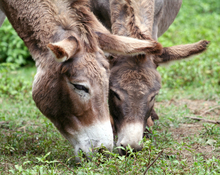Mules and donkeys have served mankind as beast of burdens for thousands of years. They have worked and lived in some of the harshest environments and still survived.

Protecting donkey health with proper nutrition
Donkeys and mules often are seen as pasture ornaments and have little to no work, yet are fed endless amounts of energy-rich nutrition which can be hazardous to their health.
Today, you can still find donkeys and mules working in such conditions and serving some of the world’s poorest people. Often poor nutrition and endless amounts of work still plague these animals. yet the opposite is true in industrial countries.
In industrialized countries, donkeys and mules often are seen as pasture ornaments and faced with little to no work and endless amounts of energy rich nutrition.
Many times, mules and donkeys are treated as horses with big ears, but this can be damaging to their health and well-being.
An article published in Equine Veterinary Education points out that donkey's don't require the same level of nutrition that horses need. Because donkeys evolved as browsers while eating shrubs and woody vegetation as well as grazers that eat mainly grass and legumes, their digestive systems are able to handle highly fibrous forage that is lower in nutritional quality than what is required by horses.
Mules share some of the nutritional pattern inherited from their donkey parents. As a rule, both donkeys and mules have significantly lower energy and protein needs when compared with horses.
Feed management for these animals should be based on moderate-quality forage and hay, which will usually be sufficient for the majority of donkeys and mules, especially if they are performing little or no work.
Except for those on an active exercise schedule, most donkeys and mules should be given only very small portions of grain, and most do not need any concentrate feeding at all.
Because donkeys and mules tend to gain weight easily and are prone to obesity and related disorders, owners may also need to restrict access to pasture. Use of grazing muzzles, dry lots, and periods of time in a stall can help to keep these equines from becoming too heavy.
